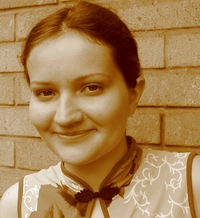Teaching with games and activities Thread poster: Rosa Elena Lozano Arton
|
|---|
In my experience I have found that no matter how different ages and backgrounds students have, they always love learning with games and activities, but I have also found that there is little material about this at my school or even in the net, that can be given out to students. If any of you can suggest anything, I would be most greatful.
Thanks to all
| | | | Sol 
United States
Local time: 15:30
Spanish to English
+ ...
A game I have been playing with my kids for several years is "I spy" ("Veo, veo" in Spanish). You can make it as easy or as complicated as you need for the age/knowledge of your students.
Here is how you play it:
One person thinks of an object he or she sees (it has to be visible to all those playing, and everyone should know what it's called). Then (s)he sais:
- I spy with my little eye something (blue) (that begins with m)
[That is, you can just g... See more A game I have been playing with my kids for several years is "I spy" ("Veo, veo" in Spanish). You can make it as easy or as complicated as you need for the age/knowledge of your students.
Here is how you play it:
One person thinks of an object he or she sees (it has to be visible to all those playing, and everyone should know what it's called). Then (s)he sais:
- I spy with my little eye something (blue) (that begins with m)
[That is, you can just go with color, or shape, or both, or you can go with letters, or sounds, begining and ending).
Everyone else guesses what it is. This can be done in an orderly fashion, going by turn, or raising their hands, or you can just let them yell the answer out... that's how we do it in long trips on the road
The Spanish version is the same, but the scrip is as follow:
-- Veo, veo.
-- ¿Qué ves?
-- Una cosa
-- ¿Qué es?
-- Una cosa (redonda y amarilla) / (que empieza con ese y termina con ele) / (sale de día y se esconde de noche)
[we generally give one clue and give more when they ask for "pistas"]
---------
A good one if the kids can move around is "¿Lobo estás?" (or your own translation into any language). I haven't translated it because I am trying for my kids to speak Spanish, but it is very adaptable. It MAKES kids talk, and it teaches about clothing. In English it means "Wolf, are you ready?"
A kid goes behind a cabinet, tree, or whatever where (s)he cannot see the other kids. This kid is the "wolf", supposely getting dressed. The other kids start the conversation:
-- Lobo ¿estás? (Wolf, are you ready?)
-- No, me estoy poniendo los pantalones [acting it out] (No, I'm putting my pants on).
-- Lobo ¿estás? (Wolf, are you ready?)
-- No, me estoy poniendo los zapatos [acting it out] (No, I'm putting my shoes on).
[...]
-- Lobo ¿estás? (Wolf, are you ready?)
-- No, me estoy poniendo el sombrero [acting it out] (No, I'm putting my hat on).
-- Lobo ¿estás? (Wolf, are you ready?)
-- SÍÍÍÍÍ PARA COMERLOS A TOODOS (YEEEES, TO EAT YOU ALL UP!)
[the "wolf" goes after the kids, and the first one to get caught will be the "wolf"]
------------
If what you mean by "activities" is puzzles and word games for one person, then check out:
http://www.educationalpress.org/educationalpress/index.asp
It lets you create your own word searches, crossword puzzles, and quizzes out of their ready-made lists or your own list. There are other sites like it, I just happen to be using this one.
Have fun! ▲ Collapse
| | | | | Teaching with games and activities | Jun 30, 2004 |
Hi Rosa and Sol,
I've got several books with good games for teaching English. The book "Edutainment, How to teach languages with fun and games" has about a 100 pages of games and also includes a cassette with 17 popular songs by the Beatles, and others. There are song pages for the cassette with "cloze exercises" for students to complete the missing words after listening to the song and there are several other exercises to do with these songs. After they've listened to the song a few times... See more Hi Rosa and Sol,
I've got several books with good games for teaching English. The book "Edutainment, How to teach languages with fun and games" has about a 100 pages of games and also includes a cassette with 17 popular songs by the Beatles, and others. There are song pages for the cassette with "cloze exercises" for students to complete the missing words after listening to the song and there are several other exercises to do with these songs. After they've listened to the song a few times and completed the excercises, the song is played one last time with everybody singing. I found that the younger students enjoyed the exercise and it was a good way to end a lesson.
http://www.eslgames.com/edutainment/#redirect
I'll add some more resources tomorrow.
Cheers, Kim ▲ Collapse
| | | | | another suggestion | Jun 30, 2004 |
I have also used "I Spy" and found it useful and fun for students of any age. Another classic game I use with beginners is "Hangman". It really helps them with spelling and pronunciation of English letters. If you've got young kids and can get active, "Mother May I?" and "Simon Says" are good choices, too. These are both games that probably all American children play at one time or another- you can probably find the rules for them on the internet...
Jennifer
| | |
|
|
|
tazdog (X)
Spain
Local time: 21:30
Spanish to English
+ ...
| lots of resources for kids on the Internet | Jun 30, 2004 |
I’ve been teaching two kids (now aged 9 and 7) for the past two years (individual classes). At that age, games and activities are a must, so I’ve had to come up with a lot of different ones.
First of all, here are some links I’ve found to be very useful:
http://www.awesomeclipartforkids.com/worksheetsindex.cfm - make your own word search and cros... See more I’ve been teaching two kids (now aged 9 and 7) for the past two years (individual classes). At that age, games and activities are a must, so I’ve had to come up with a lot of different ones.
First of all, here are some links I’ve found to be very useful:
http://www.awesomeclipartforkids.com/worksheetsindex.cfm - make your own word search and crossword puzzles (although I’ve had trouble with the crosswords here).
http://www.edhelper.com/crossword.htm - creates crossword puzzles. I make puzzles to review specific vocabulary from the textbooks we are using, or past tenses of irregular verbs, etc.
http://www.dltk-cards.com/bingo/bingo1.asp - custom bingo cards (these were a huge success at Christmas—I used the Christmas-themed picture bingo cards after practicing the vocabulary with picture flash cards for a few days).
http://members.tripod.com/~ESL4Kids/games.html - games for language learners
http://abcteach.com/directory/fun_activities/ - fun activities for kids
http://bogglesworld.com/ - lots of resources, and the board games are great (http://bogglesworld.com/esl_games.htm). I’ve adapted two of them (mine are “Say three things” and “Ask a question”) to suit the 9-year-old, and he loves them. The question game in particular is a wonderful way to take the boredom out of something that can be very tedious in an individual class. My husband, who has a lot of graphic design experience, made beautiful game boards printed in color, so these games are even more appealing.
I’ve also used card games with great success. I make up two sets of cards (the size of playing cards) with pictures of whatever vocabulary we’re working on (foods, jobs, animals, actions, etc.) and drill with them for a few days. Then we play “Go Fish” or “Memory” to match pairs. Again, this is very popular, and it’s amazing how fast they learn (and retain) the new words.
Both kids are also crazy about hidden picture puzzles. I use these as "fillers" at the end of a class or as a break between textbook exercises (or sometimes even as a bribe!). Apart from being a good vocabulary-building vehicle, they provide an excellent opportunity to practice directions/prepositions, as the kids sometimes need hints (it’s on the left/near the middle/you’re getting warmer/etc.). You can get a free puzzle every month by signing up here: http://www.hiddenpictureshotlink.com/index.jsp
Hope this gets you started.
Cindy ▲ Collapse
| | | | | Bingo to teach numbers | Jun 30, 2004 |
I use bingo to teach numbers (have one of the students call the numbers too).
They want to win at all costs and suddenly they all know their numbers really well!
| | | | Andrea Ali 
Argentina
Local time: 17:30
Member (2003)
English to Spanish
+ ...
| My pupils' favorite was Tutti Frutti | Jun 30, 2004 |
Have students draw a 5 by 5 grid on their papers. Each of the twenty-five cells should be large enough to contain a word. In the left column, have them write five categories of the game. You might choose categories such as Foods, Clothing, Parts of the Body, Verbs, Cities, Famous People or whatever you want them to practice. Now select a letter. One way of doing this is saying "A" out loud and then silently going through the alphabet until a student stops you. The letter at which you are at that... See more Have students draw a 5 by 5 grid on their papers. Each of the twenty-five cells should be large enough to contain a word. In the left column, have them write five categories of the game. You might choose categories such as Foods, Clothing, Parts of the Body, Verbs, Cities, Famous People or whatever you want them to practice. Now select a letter. One way of doing this is saying "A" out loud and then silently going through the alphabet until a student stops you. The letter at which you are at that point will be the letter for the first column. In a given time period (three minutes for example) students have to write one word starting with the given letter for each category. Instead of giving them a time period, you can also have them write until the first student has written down a word for each category. That student then says, "Stop" and thereby requires all the others to stop writing at that point. Students can do this for five letters, writing five columns (or more, if you had them draw a bigger grid). The student with the most words wins. This can also be done in groups. Instead of individual grids on paper, have one student write down the words that are generated by his or her group. Again, the group with the most words wins.
More on:
http://ling.ucsd.edu/Language/lim/games/1ddx.html
Hangman was among their favorite games too!
Enjoy!
Andrea
[Edited at 2004-06-30 14:34] ▲ Collapse
| | | | | Another activity | Jun 30, 2004 |
Songs: Try to find some quality songs by either known or new artists (if that's difficult, try contacting radio stations for demos... worked for me), transcribe the lyrics and let your students fill in the blanks whilst replaying the song a couple of times. Let them look up the words in a dictionary and have them write down a number of sentences including the words from the blanks....
Role plays: subjects with which your students can experiment a bit: "shopping", "hotels", even som... See more Songs: Try to find some quality songs by either known or new artists (if that's difficult, try contacting radio stations for demos... worked for me), transcribe the lyrics and let your students fill in the blanks whilst replaying the song a couple of times. Let them look up the words in a dictionary and have them write down a number of sentences including the words from the blanks....
Role plays: subjects with which your students can experiment a bit: "shopping", "hotels", even some science fiction situations.... anything will do. What worked for me: write a limited number of subjects on the blackboard, let them excercise a bit and then "throw them in the deep".
Dutch students love it. ▲ Collapse
| | |
|
|
|
| | | | | Want to thank you | Jul 4, 2004 |
Dear Sol:
I just want to thank you so much! I think you have great ideas that will help a lot in my teaching. Please keep in touch with me if you get any other. Rosa Elena
Sol wrote:
A game I have been playing with my kids for several years is "I spy" ("Veo, veo" in Spanish). You can make it as easy or as complicated as you need for the age/knowledge of your students.
Here is how you play it:
One person thinks of an object he or she sees (it has to be visible to all those playing, and everyone should know what it's called). Then (s)he sais:
- I spy with my little eye something (blue) (that begins with m)
[That is, you can just go with color, or shape, or both, or you can go with letters, or sounds, begining and ending).
Everyone else guesses what it is. This can be done in an orderly fashion, going by turn, or raising their hands, or you can just let them yell the answer out... that's how we do it in long trips on the road 
The Spanish version is the same, but the scrip is as follow:
-- Veo, veo.
-- ¿Qué ves?
-- Una cosa
-- ¿Qué es?
-- Una cosa (redonda y amarilla) / (que empieza con ese y termina con ele) / (sale de día y se esconde de noche)
[we generally give one clue and give more when they ask for "pistas"]
---------
A good one if the kids can move around is "¿Lobo estás?" (or your own translation into any language). I haven't translated it because I am trying for my kids to speak Spanish, but it is very adaptable. It MAKES kids talk, and it teaches about clothing. In English it means "Wolf, are you ready?"
A kid goes behind a cabinet, tree, or whatever where (s)he cannot see the other kids. This kid is the "wolf", supposely getting dressed. The other kids start the conversation:
-- Lobo ¿estás? (Wolf, are you ready?)
-- No, me estoy poniendo los pantalones [acting it out] (No, I'm putting my pants on).
-- Lobo ¿estás? (Wolf, are you ready?)
-- No, me estoy poniendo los zapatos [acting it out] (No, I'm putting my shoes on).
-- No, me estoy poniendo el sombrero [acting it out] (No, I'm putting my hat on).
-- Lobo ¿estás? (Wolf, are you ready?)
-- SÍÍÍÍÍ PARA COMERLOS A TOODOS (YEEEES, TO EAT YOU ALL UP!)
[the "wolf" goes after the kids, and the first one to get caught will be the "wolf"]
------------
If what you mean by "activities" is puzzles and word games for one person, then check out:
http://www.educationalpress.org/educationalpress/index.asp
It lets you create your own word searches, crossword puzzles, and quizzes out of their ready-made lists or your own list. There are other sites like it, I just happen to be using this one.
Have fun!
[/quote]
| | | |
one of my students' (college freshmen! yes, games never get old) favorites is taboo (more or less). the way i have them play is to break them into groups of 3-5 and give each group a set of cards, each card with a vocab word from the chapter. they take turns drawing a card and describing the word in the foreign language (preferably in complete sentences) to the others. if someone guesses correctly, both the person with the correct guess and the person describing earn a point. if no one guess... See more one of my students' (college freshmen! yes, games never get old) favorites is taboo (more or less). the way i have them play is to break them into groups of 3-5 and give each group a set of cards, each card with a vocab word from the chapter. they take turns drawing a card and describing the word in the foreign language (preferably in complete sentences) to the others. if someone guesses correctly, both the person with the correct guess and the person describing earn a point. if no one guesses or if the describer uses english (native) or the word on the card, no points are scored and play passes to the next person.
trivia games over cultural tidbits, 20 questions, board races (such as writing the sentence you say but changing the tense, or replacing the direct/indirect objects with pronouns, or at a very basic level, just writing what they hear), game shows, talk shows, pictionary, charades, etc. are all also big hits. another is to have a brief questionnaire that everyone fills out, then read individuals' questionnaire responses out loud and have the others guess whose it is (on teams if they like to compete). you can teach them--or, depending on their level, have them teach each other--hands-on skills using the language (i sometimes teach mine to juggle and have had some students teach the class how to cook or make something). ▲ Collapse
| | |
|
|
|
Marta Argat 
Local time: 22:30
Chinese to Ukrainian
+ ...
| Body, Crime, Suspect :) | Mar 12, 2006 |
I teach Ukrainian at a Saturday morning school to teenagers whose first language is English. Yesterday I let them ask questions and describe a room (a pretended "crime scene" that time) using a popular book on forensic science for teenagers as a guide. http://www.scholastic.ca/titles/bodycrimesuspect/
I couldn't even predict how much excited they would be! ... See more ... See more I teach Ukrainian at a Saturday morning school to teenagers whose first language is English. Yesterday I let them ask questions and describe a room (a pretended "crime scene" that time) using a popular book on forensic science for teenagers as a guide. http://www.scholastic.ca/titles/bodycrimesuspect/
I couldn't even predict how much excited they would be! ▲ Collapse
| | | | Kootvela (X)
Local time: 22:30
Lithuanian to English
+ ...
There's a book Game On from Express Publishing with lesson plans and photocopiables for different language games.
Another one, '7000 classroom activities' (I hope I'm getting it right) also is about games.
| | | | To report site rules violations or get help, contact a site moderator: You can also contact site staff by submitting a support request » Teaching with games and activities | CafeTran Espresso | You've never met a CAT tool this clever!
Translate faster & easier, using a sophisticated CAT tool built by a translator / developer.
Accept jobs from clients who use Trados, MemoQ, Wordfast & major CAT tools.
Download and start using CafeTran Espresso -- for free
Buy now! » |
| | Trados Studio 2022 Freelance | The leading translation software used by over 270,000 translators.
Designed with your feedback in mind, Trados Studio 2022 delivers an unrivalled, powerful desktop
and cloud solution, empowering you to work in the most efficient and cost-effective way.
More info » |
|
| | | | X Sign in to your ProZ.com account... | | | | | |













